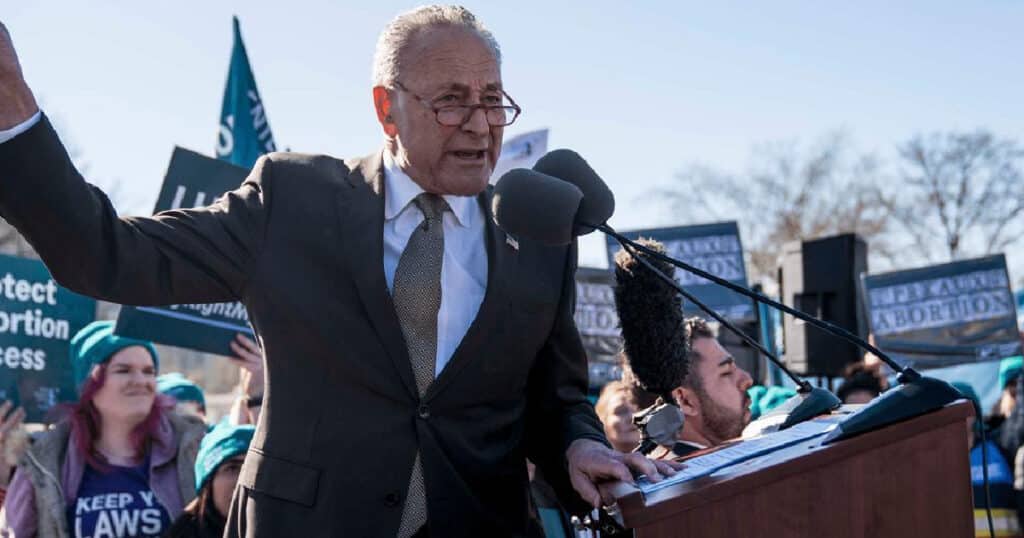
Federal funding package includes litany of pork projects
Hundreds of pages of earmarks are included in the compromise deal that Congressional leaders say they’ve reached to fund the federal government.
Whether the votes are there to pass it will be revealed this week.
The more than 1,000-page deal includes six appropriations bills that total $435 million and earmarks, also known as pork – a practice of allocating federal tax dollars to local spending projects often used to win votes from hesitant lawmakers. The practice had been banned but has returned with full force in recent years.
For example, one earmark in the bill would allocate $1 million to renovate the William Way LGBT Community Center in Philadelphia at the request of both of Pennsylvania’s Democratic U.S. senators, Bob Casey and John Fetterman, as well as Rep. Brendan Boyle.
Equity earmarks get plenty of attention as well. The city of Norwalk in California transportation system would get $850,000 for a “Bus Stop Equity Project” at the request of California Democrats Rep. Linda Sanchez and Sen. Alex Padilla.
The earmarks range across hundreds of projects, from funding local community centers to grant programs to construction projects and more, usually pouring hundreds of thousands of dollars into each project, at the involved lawmakers’ request.
In a bipartisan instance, $1.5 million is set aside for improvements to a fire station in the Village of Richfield Springs in New York at the request of Republican Rep. Elise Stefanik and Democratic Sen. Kirsten Gillibrand
A vote on the funding package is expected in the House on Friday, but votes are fluid and could change, especially if there is significant pushback from lawmakers.
Last Friday, House Speaker Mike Johnson, R-La., rallied about half his party and a sizable group of Democrats to pass a stopgap funding measure that was then passed by the Senate and signed by the president.
That measure pushed back the staggered government shutdown deadlines until this Friday and March 22.
“It’s good news that Congress has finally reached a bipartisan agreement on the first six government funding bills that will keep the government open,” Sen. Chuck Schumer, D-N.Y., said in a statement on Sunday. “We are proud to be keeping the government open without cuts or poison pill riders.”
What Schumer called “poison pills” are what Republicans consider key legislative wins that were not included in this new agreement.
Some Republicans had hoped to block a range of liberal goals, including funding for red flag laws and mail-in chemical abortion pills as well as taxpayer dollars going toward prosecuting a presidential candidate which is of course a response to the prosecution of former President Donald Trump.
Sen. Mike Lee pointed out many of these problems and blasted the legislation for including earmarks.
The legislation “fails to prohibit taxpayer funding from carrying out DOE’s gas stoves rule,” Lee wrote on X, formerly known as Twitter, adding that it also “fails to prohibit taxpayer funding from carrying out any program, project, or activity that promotes or advances CRT.”
Nearly 100 lawmakers in the House voted against the one-week stopgap extension last Friday. The removal of the key conservative policy goals could embolden that opposition.
While Senate Republicans were more willing to vote for a one-week extension last week, several raised concerns after the text of the new package was released Sunday.
Sen. Rick Scott, R-Fla., blasted the spending package online as well, saying that “the first six spending bills we’re supposed to vote on this week that includes 605 PAGES OF EARMARKS.”
“One example? Schumer’s $1 MILLION ask to build a new environmental justice center in NYC…” he added.
Republican leadership touted the wins they were able to get on the funding package..
“The final Fiscal Year 2024 appropriations bills achieve what we set out to do: strategically increase defense spending and make targeted cuts to wasteful non-defense programs,” House Appropriations Chairwoman Kay Granger, R-Texas, said in a statement.



